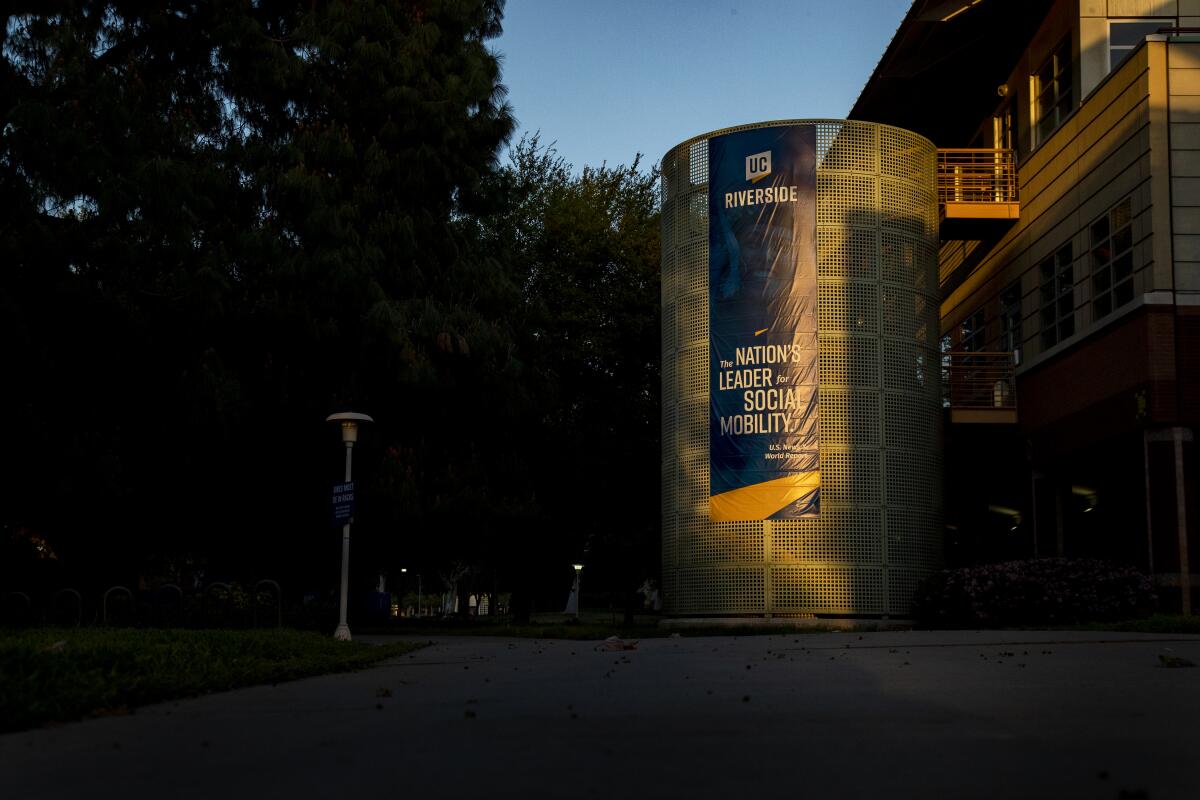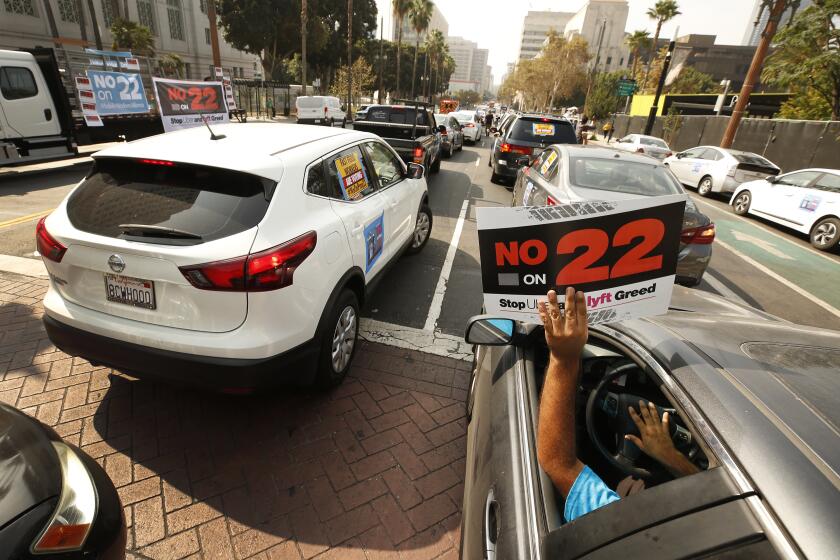UC Riverside should investigate ‘phony’ economics research center, faculty say

- Share via
Some University of California faculty members are raising the alarm about a research center affiliated with UC Riverside that they say uses corporate funding for reports “attacking proposals to improve the lives of working Californians.”
The research center, known as the UC Riverside School of Business Center for Economic Forecasting and Development, is not operated by university faculty and is instead run by private consulting company Beacon Economics. The firm produces economic research reports for the university but also pays UC Riverside royalty fees to publish its own reports using the center’s name.
A letter signed by more than 100 faculty members and graduate students from across the UC system argues that the arrangement allows corporations and industry groups to sponsor research and use the findings to advance their interests without academic oversight or transparency. The letter, submitted Tuesday to UC regents, urges the university system to investigate its relationship with the center.
“We unequivocally support academic freedom and freedom of speech,” the letter reads. “We believe, however, that Beacon’s UC-branded, corporate-funded reports often fail to meet the high standards we strive to meet in our research, thus endangering the credibility of our work and harming the University of California’s good name.”
Beacon Economics founder Christopher Thornberg is listed as director as well as an adjunct professor on the research center’s website, but, the letter notes, Thornberg’s name doesn’t appear in school faculty or other directories.
More than 100 UC faculty members and graduate students signed a letter urging the UC Regents to investigate its relationship with Beacon Economics, a private firm that pays royalty fees to operate and produce research as the UC Riverside School of Business Center for Economic Forecasting and Development.
Thornberg defended the center’s research record and said the UC faculty members were mobilized by the Service Employees International Union, which represents fast-food workers and others, because the union disagrees with the empirical results of his research.
“We don’t sell answers. We sell analysis,” Thornberg said. “I insist on 100% control over our findings, period.”
Thornberg was a tenure-track professor at Clemson University and a senior economist at UCLA Anderson Forecast, another UC research center focused on economic analysis, before he founded Beacon Economics in 2006.
“As opposed to debating me on the merits of my report, they are instead attacking me blindly, without even talking to me,” Thornberg said. “This petition is packed full of completely false allegations about my center, about our relationship with the university and about me.”
The arrangement began in 2015, when UC Riverside created the research center and commissioned Beacon Economics to produce local economic trend reports to bolster the business school’s prominence in the Inland Empire region.
The faculty letter primarily takes issue with the center’s more recent research on issues of state public policy. The center in recent years published Lyft-funded reports promoting Proposition 22, a 2020 voter initiative to treat app-based and delivery drivers as independent contractors, and a California Restaurant Assn.-funded paper concluding the state’s restaurant industry had been negatively affected by increases in California’s minimum wage.
The letter highlighted a report the center released last August, paid for by a fast-food industry group, criticizing legislation seeking to create a statewide representative body including workers and restaurant franchisees to set wages and working standards for the industry. The report concluded that introducing a higher minimum wage sanctioned by the law, called AB 257, would increase fast-food prices by 20% or more.
California voters complain that canvassers for a measure to repeal a law expanding protections for fast-food workers lied about the effects.
The research was widely cited by AB 257 opponents, a coalition of restaurant and business trade groups, which mounted a successful effort to block the law from going into effect until voters weigh in on a measure next year that would repeal the law. The report notes the funding arrangement in a line: “This research was supported by the International Franchise Association.”
The letter contrasted that report with research into restaurant prices in cities where the minimum wage was increased substantially, showing minimal effect.
Thornberg in September, responding to questions from The Times, said that his AB 257 report erroneously implied that a rise to a $22 minimum wage alone would cause a 20% increase in fast-food prices. He said the calculation included other costs he projects associated with the legislation.
Thornberg did not amend the August report to clarify the methodology. But a second report Thornberg authored examining AB 257’s potential effect on restaurant sales and competitiveness included a brief description of other labor costs he associates with the legislation in addition to wage increases. The second report bumps up Thornberg’s prediction on restaurant price increases to 30% or more.
David Fairris, an emeritus professor of economics and a former vice provost for undergraduate education at UC Riverside, wrote a lengthy note to leadership of the campus’ school of business Feb. 2 outlining his concerns with Thornberg’s research on AB 257; he described Thornberg’s analysis as “grossly over-simplified.”
“Mr. Thornberg fails entirely to become steeped in the minimum wage literature; indeed, there are no citations whatsoever in his study,” Fairris writes.
Lawyers for gig companies and their workers squared off in a California appeals court on whether it should uphold a ruling that Proposition 22 is unconstitutional and unenforceable.
UC Santa Barbara history professor Nelson Lichtenstein called the center “phony” and said that while corporate-backed research is not uncommon, it’s important to clearly and publicly assert “this is where I got the money from” and to have the research undergo peer review — that is, evaluation by outside experts.
“This is one of the weapons that’s used in public policy debates,” Lichtenstein said. “You do want to keep it honest, as much as you can.”
That UC Riverside collects royalty revenue from the center is “completely reprehensible” and a “blatant invitation to various forms of ethics violations,” said Dylan Rodriguez, a media studies professor at UC Riverside and former chair of UC Riverside’s Faculty Senate who helped to circulate the faculty letter.
Rodriguez presented faculty concerns during public comment at the Thursday meeting of the UC Regents, the university system’s governing body.
“This is a perfect example of the university industrial complex,” Rodriguez said. “A UC research center premised on a profit-making agenda rather than some basic commitment to scholarship.”
UC Riverside spokesperson John Warren said campus administration has requested that Beacon Economics modify the fast-food minimum wage report to “clarify that the report was neither commissioned nor endorsed” by the university.
The nation’s embrace of e-commerce is changing the landscape in one Southern California region.
The university’s agreement with Beacon Economics for regional economic research expired in December. Warren said UC Riverside is negotiating a new contract and “intends to continue its working relationship with Beacon.”
“The university will be vigilant in how it implements the new agreement, including for when it is appropriate for university branding to be used,” Warren said. “Allegations of misconduct are taken seriously, and there are university reporting procedures in place to receive and investigate these allegations for faculty and others.”
UC Riverside’s business school pays Beacon Economics $140,800 annually to run a conference branded as an event by the research center, as well as for a set number of white papers and other analyses.
In addition, UC Riverside collects a 10% royalty fee for projects initiated by Beacon Economics that bear the university’s logo, a Times review of Beacon Economics’ contracts with UC Riverside shows. Documents were obtained by Service Employees International Union through a public records request and shared with The Times.
A tally of checks from Beacon Economics shows the firm paid the campus almost $68,000 for 2022 projects, meaning Beacon took in close to $680,000 for work it generated bearing UC Riverside branding.
A separate agreement outlining terms of Beacon Economics’ use of university branding appears to have lapsed in 2018, and a request for records did not turn up a renewal. Warren said that agreement was extended, according to the business school, and he is seeking clarification regarding the terms of the renewal.
During this month’s historic heat wave, employees at Amazon’s largest West Coast air freight facility were conducting their own workplace temperature checks.
Records of Beacon Economics’ quarterly revenue from the research center show the International Franchise Assn. paid $93,750 in September for an analysis of AB 257.
The California Restaurant Assn. paid $42,000 in 2019 for a study of the restaurant industry. Lyft and Protect App-Based Drivers & Services, a coalition of gig companies including Uber, Lyft, DoorDash and Instacart, paid $173,000 for analyses related to gig workers’ wages in 2020 and 2021.
Revenue records show Lyft paid $10,000 for “The Centers Response to Berkeleys Prop 22,” probably referring to an August 2020 report analyzing the effects of Proposition 22 on driver earnings in response to an October 2019 blog post by the UC Berkeley Labor Center critiquing the initiative.
Warren dismissed some faculty concerns expressed as ideologically motivated.
“Beacon’s findings may prove unpopular with some audiences for reasons that transcend the integrity of the methodology,” Warren said.
Beacon Economics responded similarly, arguing the faculty letter was an extension of efforts by one of California’s largest unions, which sponsored the fast-food law, to discredit opposing research.
Victoria Bond, who serves as spokesperson for both Beacon Economics and the Riverside research center, said the concerns raised in the letter are being circulated by “select UC faculty members who are aligned ideologically with SEIU.”
Bond said the UC Riverside center is subject to the same type of academic review and adheres to the same standards that apply to all UC centers.
Oversight is decentralized and relies on the leadership of “a qualified academic to lead and oversee the center’s research.” The dean of UC Riverside’s business school selected Thornberg for that academic oversight, and the adjunct professor designation was voted on by faculty members, she said.
“The selection is ultimately accepted or denied based on the candidate’s credentials, which is why there is no one central oversight,” Bond said in an email. “We feel this entire episode has been a form of ideological retaliation and is not based on the merits of the research itself.”
Bond said Beacon Economics has in the past been commissioned multiple times by SEIU to conduct analyses on its behalf, which “should speak to the nonpartisanship and academic quality of our researchers’ work.”
Beacon Economics has delivered three reports analyzing home-care workers’ wages for SEIU Local 2015 since 2018. The firm said that beyond those reports, it has delivered seven other projects that are not publicly available, including impact analyses, overtime analyses and revenue forecasts, to two other SEIU groups, going back to 2010.
An October news release by SEIU Local 2015 — which represents home-care workers for elderly and disabled people and has been lobbying for pay increases — highlights a 2022 Beacon Economics report showing economic benefit to Los Angeles County if the minimum wage of such workers was raised to $20. The news release describes Beacon Economics as a “highly respected firm specializing in sustainable growth” and says L.A. County’s Board of Supervisors relies on the firm for “accurate analysis.”
In response to a request for comment, SEIU spokesperson Isabel Urbano said the local has terminated its relationship with Beacon Economics moving forward.
“We’ve learned that some of Beacon Economics’ work is in contradiction to our members’ values and their goals of advancing the dignity and worth of all workers,” SEIU Local 2015 said in a statement.
More to Read
Inside the business of entertainment
The Wide Shot brings you news, analysis and insights on everything from streaming wars to production — and what it all means for the future.
You may occasionally receive promotional content from the Los Angeles Times.















